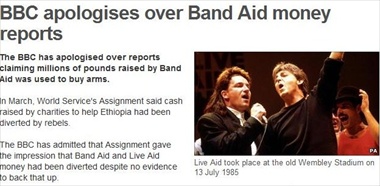
See above. It's a screenshot of the BBC's report apologizing for giving the "impression" the money from Band Aid went to arms purchases. (Credit: BBC)
The BBC issued an groundbreaking apology Nov. 4 to Band Aid Trust for its “unfair allegations” that the organization’s funds were used to buy arms. The trust was created “to help relieve hunger and poverty in Ethiopia and the surrounding countries,” its website explains.
As the Independent noted, the apology “will be the first ever simultaneously broadcast across all three BBC services – TV, radio and online. It will be heard on BBC1, BBC News 24, World Service radio, Radio 4, and posted on the BBC website. ”
The apology comes after a March 4 BBC “Assignment” program titled “Aid for Arms in Ethiopia” reported that “large amounts of aid reaching Tigray from various sources during the Ethiopian famine of the mid-80s had been diverted by a rebel group to buy weapons,” the Independent explained.
While those allegations were reported, clips of Bob Geldof and the Band Aid promotional song played “as background.” (The BBC reported that 1985’s Live Aid concert raised more than 30 million pounds for “the starving in Africa.” Geldof co-organized the Live Aid concert.)
The story was by BBC’s Africa editor Martin Plaut. The program and the story have been removed from the BBC website following the Editorial Complaints Unit’s ruling.
Other evidence for the allegations in Plaut’s program included a former US ambassador, whose comments were deemed to have been used “in a misleading way,” and a CIA report, which was from before LiveAid ever happened. Also, the program didn’t “inform listeners of the unreliablity of the witness who made its most dramatic claim – that 95 per cent of aid was misappropriated,” according to the Independent.
According to the Independent, the apology read:
“The BBC has investigated these statements and concluded that there was no evidence for them. The BBC wishes to make clear that these statements should not have been broadcast, and to apologise unreservedly to the Band Aid Trust for the misleading and unfair impression which was created.”
The full apology can be read here.
Geldof described the program as showing “an unusual lapse in standards by BBC,” noting that BBC’s reporting in Ethiopia triggered his creation of Band Aid, according to the Independent. But, as a result of the March program, Geldof charged that “the BBC’s misleading and unfair coverage on this story has done unknown damage to ordinary people’s willingness to donate their hard-earned cash to disaster funds.”
MIchael Grade, a former BBC chairman and current Band Aid trustee, argued that Live Aid and Geldof were included in the March program to “sex up” the report. “There’s no question in my mind that they succumbed to the temptation to sex up the story by dragging in Bob Geldof and Live Aid,” Grade is quoted as saying.
A BBC spokesperson admitted that the news outlet’s reporting may have given ‘the impression” of wrongdoing, but clarified that the Assignment program never specifically claimed “that relief aid provided by Band Aid was diverted,” The Telegraph reported.
The BBC reported that Geldof wanted to know why BBC didn’t apologize quicker. In response, BBC quoted BBC’s global news director Peter Horrocks as explaining the complaint “was a detailed one – there were lots of detailed aspects that have been gone into and fresh research was done”.
“The thoroughness of the complaints procedure and the fact that the BBC can wholeheartedly acknowledge that errors have been made I would regard as being a strength,” Horrocks is quoted as saying.
However, The Telegraph noted that a BBC director-general Mark Thompson responded to Band Aid Trust’s initial complaint about the report in late May, defending the reporting as “robust and excellent journalism.”
The original report aired March 4. The BBC’s editorial complaints unit concluded that the BBC’s program suggested “that the claims of diversion related, inter alia, to Band Aid/Live Aid money.”
But, there wasn’t any support for those claims so the program was “unfair” to Band Aid. However, the editorial complaints unit decided that the suggestive claims weren’t “motivated by a desire to sensationalise the story.”
iMediaEthics is writing to Plaut and Geldof for comment and will update with any response.
iMediaEthics recently wrote about the BBC editorial complaints unit here, when it faulted a BBC “Culture Show” program for two errors.





"the program didn’t "inform listeners of the unreliablity of the witness who made its most dramatic claim – that 95 per cent of aid was misappropriated," according to the Independent."
But what ‘The Independent’ didn’t inform its readers was that their reporter Paul Vallelly had ‘ghost-written’ two of Bob Geldof’s books (his autobiography and a Christmas book on Africa Geldof brings out on the back of a BBC series in 2005 with ‘additional text by Paul Vellaly’).
Paul Vellaly’s own webblog confirms that as well as being Associate Editor of ‘The Independent’ he was also a member of the Secretariat of The Commission for Africa which has lots of fine words about the role of African journalists in exposing corruption and whose Members included Bob Geldof, Tony Blair, Gordon Brown …. oh and President Meles Zenawi of Ethiopia who was the guy being accused of proposing diversion of aid to arms and setting up a ‘party within a party’ at the Tigrayan People’s Liberation Front Conference held from 12-25 July 1985 where ‘the witness’ is present – and is purged when he speaks up for the poor!
The man referred to is Dr Aregawi Berhe, whose father was a district judge, and who unlike Geldof didn’t need a ‘ghost’ to write his book – an academically rigorous account entitled ‘A Political History of The Tigray People’s Liberation Front (1975-1991): Revolt, Ideology and Mobilisation in Ethiopia’ (July 2009) which was publicly examined for the degree of PhD in front of experts in the field as required for a doctoral thesis in Leiden University.
Dr Aregawi made no accusation or reference to Bob Geldof or Live Aid in the book or the BBC World Service Programme – though he is critical of President Meles Zenawi of Ethiopia and his faction. It is perhaps better to listen to the BBC programme and read the book. And Meles could release the tape-recordings and records of the relevant meetings of the Central Committee to clarify things?
‘Yes I remember taking you hostage – come and stay!’ Fascinating piece by The Sunday Times journalist Jon Swain about meeting former TPLF Military Commander Aregawi Berhe in The Hague – some 33 years after he released the British journalist from capitivity in Tigray in 1976: http://www.timesonline.co.uk/tol/news/world/africa/article6926735.ece